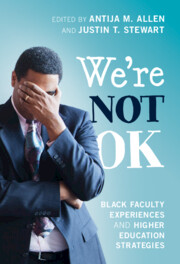Book contents
- We’re Not OK
- We’re Not OK
- Copyright page
- Contents
- Contributors
- Acknowledgments
- Introduction Breaking Our Silence
- Part I Experiences – The Journey from Student to Faculty
- Chapter 1 Why Are You Talking White? Code-Switching in Academia
- Chapter 2 Classroom Dynamics: Uncovering Hidden Truths while Black
- Chapter 3 Systemic Racism, the Well-Known Secret Facing African-American Adjunct and Full-Time Faculty in Higher Education
- Chapter 4 I’m A Black PhD, and I Still Have to Fight!
- Chapter 5 Surviving Higher Learning: Microinvalidations of Black Junior Faculty in Higher Education
- Chapter 6 How Race Impacts Teaching Returning Adult Students
- Part II Promoting Mental Wellness
- Part III Strategies for Inclusion and Retention
- Index
- References
Chapter 6 - How Race Impacts Teaching Returning Adult Students
from Part I - Experiences – The Journey from Student to Faculty
Published online by Cambridge University Press: 21 April 2022
- We’re Not OK
- We’re Not OK
- Copyright page
- Contents
- Contributors
- Acknowledgments
- Introduction Breaking Our Silence
- Part I Experiences – The Journey from Student to Faculty
- Chapter 1 Why Are You Talking White? Code-Switching in Academia
- Chapter 2 Classroom Dynamics: Uncovering Hidden Truths while Black
- Chapter 3 Systemic Racism, the Well-Known Secret Facing African-American Adjunct and Full-Time Faculty in Higher Education
- Chapter 4 I’m A Black PhD, and I Still Have to Fight!
- Chapter 5 Surviving Higher Learning: Microinvalidations of Black Junior Faculty in Higher Education
- Chapter 6 How Race Impacts Teaching Returning Adult Students
- Part II Promoting Mental Wellness
- Part III Strategies for Inclusion and Retention
- Index
- References
Summary
In a research study exploring whether educators of returning adult students changed their teaching approaches to meet their students’ needs, an unexpected finding emerged (Allen, 2018). Faculty reported that race had a direct impact on how they interact with their students. This was an unprompted yet vital finding in a study where more than half of the participants were people of color (nine identified as Black and one as Hispanic). This chapter adds to adult learning literature by exhibiting the perspectives of Black faculty who educate returning adult students. It further explores how and why some Black faculty at predominantly White institutions (PWIs) individualize their teaching approaches (delivery, communication style, and content) based on the race/ethnicity of their students. It ends with suggested faculty: diversity, equity, inclusion (DEI), and retention strategies for leaders and decision makers in higher education.
- Type
- Chapter
- Information
- We're Not OKBlack Faculty Experiences and Higher Education Strategies, pp. 94 - 110Publisher: Cambridge University PressPrint publication year: 2022
References
- 1
- Cited by



